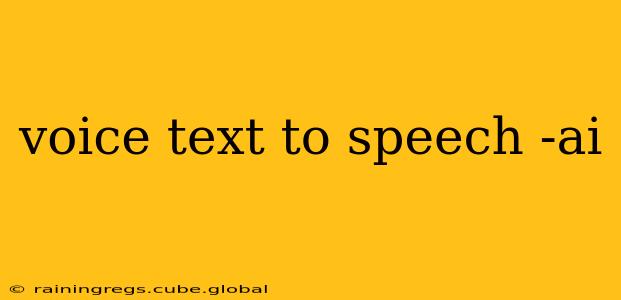The world of text-to-speech (TTS) has undergone a dramatic transformation thanks to advancements in artificial intelligence (AI). No longer limited to robotic-sounding voices, AI-powered TTS systems are now capable of producing natural-sounding speech, opening up exciting possibilities across various industries and for individuals with diverse needs. This comprehensive guide explores the intricacies of AI-powered voice text-to-speech technology, examining its capabilities, applications, and future implications.
What is AI-Powered Voice Text to Speech?
AI-powered voice text-to-speech technology uses artificial intelligence algorithms to convert written text into spoken words. Unlike older TTS systems that relied on pre-recorded audio snippets, AI-driven solutions leverage deep learning models to generate speech that is more fluid, expressive, and human-like. These models are trained on massive datasets of audio and text, enabling them to learn the nuances of pronunciation, intonation, and rhythm, resulting in a significantly improved listening experience.
How Does AI Improve Text to Speech?
The integration of AI has revolutionized several key aspects of TTS technology:
-
Natural Language Processing (NLP): AI-powered TTS systems employ sophisticated NLP techniques to understand the context and meaning of the text, enabling them to generate more accurate and natural-sounding speech. This includes correctly handling punctuation, understanding idioms, and adapting pronunciation based on the surrounding words.
-
Improved Voice Quality: AI algorithms can generate voices that are indistinguishable from human speech in many cases. The development of neural network-based voice synthesis models has significantly enhanced the realism and expressiveness of synthesized speech.
-
Customization Options: AI allows for greater personalization of voices. Users can often choose from a range of voices, adjust parameters like speed and pitch, and even create custom voices based on specific requirements.
-
Multilingual Support: AI-powered TTS systems can handle multiple languages, making them accessible to a global audience. The ability to synthesize speech in different accents and dialects further enhances their versatility.
What are the Applications of AI Voice Text to Speech?
The applications of AI-powered voice text-to-speech are vast and continually expanding:
-
Accessibility: For individuals with visual impairments or dyslexia, AI TTS provides an invaluable tool for accessing written content. It enables them to consume news articles, books, and other materials independently.
-
Education: AI TTS can be used to create engaging learning materials, including audiobooks, interactive lessons, and personalized tutoring systems.
-
Entertainment: From audiobooks and podcasts to video games and virtual assistants, AI TTS is transforming the entertainment industry, providing immersive and engaging experiences.
-
Customer Service: AI-powered chatbots and virtual assistants are increasingly leveraging TTS to provide automated customer support, answering questions and guiding users through processes.
-
Assistive Technology: AI TTS plays a critical role in various assistive technologies, helping individuals with disabilities to communicate and interact with their environment more effectively.
What are some popular AI text-to-speech software programs?
Numerous software programs leverage AI for text-to-speech. Many are integrated into operating systems or readily available online, offering varied features and pricing. Specific program names are omitted here to avoid appearing as a promotion, but a simple online search will reveal many options based on your specific needs and budget.
How accurate is AI text to speech?
The accuracy of AI text-to-speech varies depending on the quality of the underlying model and the complexity of the input text. Modern AI systems achieve remarkably high accuracy rates, but challenges remain in handling complex sentences, nuanced expressions, and uncommon words. However, ongoing improvements in AI technology continuously enhance accuracy.
Is AI text to speech free?
Many AI text-to-speech options offer free tiers or trials, but fully featured programs often require paid subscriptions. The cost can vary greatly depending on factors such as voice quality, customization options, and usage limits.
What are the limitations of AI text to speech?
Despite its advancements, AI-powered text-to-speech technology still has limitations. Accurately conveying emotion, sarcasm, and subtle nuances of language remains a challenge. Furthermore, the generation of high-quality speech can be computationally expensive, requiring significant processing power.
The Future of AI Voice Text to Speech
The future of AI-powered voice text-to-speech is bright. Ongoing research and development are focused on enhancing the naturalness, expressiveness, and emotional range of synthesized speech. We can expect to see even more realistic and human-like voices, alongside improved handling of complex language structures and diverse accents. The integration of AI TTS with other technologies, such as augmented reality and virtual reality, will also unlock new and exciting possibilities for communication and interaction.
In conclusion, AI-powered voice text-to-speech technology represents a significant leap forward in communication technology, impacting numerous aspects of our lives. As the technology continues to evolve, it promises to become an even more powerful and indispensable tool for individuals, businesses, and society as a whole.
